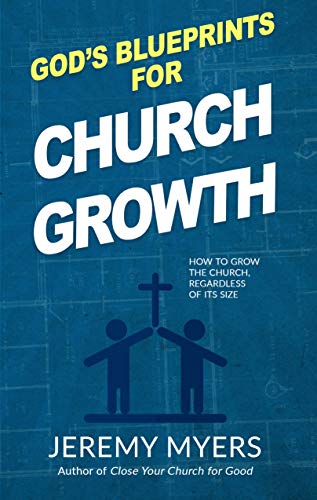In Ephesians 4:14-16, we have some clear instructions on what the church is supposed to do. There are two parts to these instructions of God about the task of the church, and so we will consider them in two different studies. I previously considered Ephesians 4:14, and this study looks at Ephesians 4:15-16.
(#AmazonAdLink)  Both of these studies, along with all the others in this series, are drawn from my book, (#AmazonAdLink) God’s Blueprints for Church Growth.
Both of these studies, along with all the others in this series, are drawn from my book, (#AmazonAdLink) God’s Blueprints for Church Growth.
The Task of the Church (Part II): Growing Adults (Ephesians 4:15-16)
“… but, speaking the truth in love, may grow up in all things into Him who is the head—Christ—from whom the whole body, joined and knit together by what every joint supplies, according to the effective working by which every part does its share, causes growth of the body for the edifying of itself in love.”
Ephesians 4:15-16
When the majority of people in the United States think of “church growth” they think of a church that has more people attending the Sunday morning service this year than last year. Such numerical growth in the pews leads to a larger budget and maybe a larger building.
So it is not surprising that one popular book on church growth begins with the following statement:
Since 1966, [our church] has grown from 125 to over 13,500 in worship. We have gone through five building programs and two complete relocation projects, the last of which cost over ninety million dollars (including land, construction costs, and architects’ fees). We have gone from an annual budget of eighteen thousand dollars to an annual budget of eighteen million dollars.[1]
This is the popular definition of church growth. According to most, church growth is measured with bodies, bucks, and bricks, with more people, more money, and bigger buildings.[2]
Since growth is one of the top priorities of every local church, those who measure church growth with bodies, bucks, and bricks will often use whatever means necessary to get such things. I have a comic strip in my office showing a pastor asking his elders for ideas on how to grow the church. He says, “Besides calling every Sunday ‘Easter,’ does anyone else have ideas for improving church attendance?”
I also have an article from TIME magazine about a church whose “Ultimate Goal” was to get 40% of the people in its area back to church within one year. The article reported that in order to accomplish this, the pastor sang and danced the Lord’s praises in an “electric whirlwind” which he termed, “Aerobics of the Lord.” He executes choreographed jumps, leaps, and twists that the faithful try to copy. And when the Spirit really moves, he pours buckets of holy water on his ecstatic audience.[3]
Yet this is fairly mild compared to what some churches do. One pastor in California collected a file of news clippings about how churches were employing innovations to keep their worship services from becoming dull. In only five years’ time, “some of America’s largest evangelical churches have employed worldly gimmicks like slapstick [comedy] … wrestling exhibitions, and even a mock striptease to spice up their Sunday meetings.”[4] If churches want more bodies, bucks, and bricks, these are some of the things that churches can do to accomplish this kind of growth.
However, just because we can do something, doesn’t mean we should. But maybe the real problem isn’t so much in what these churches are doing, but why. Maybe the problem is that they are chasing after the wrong type of church growth. What if numeral growth is not biblical church growth? What if God’s idea of church growth is not measured with bodies, bucks, and bricks, but with some other measurement entirely?
If this is the case, then most of what we do in church could possibly be wrong! After all, if our definition of church growth is wrong, then the methods we use to achieve this growth will also be wrong.
Thankfully, the solution is relatively simple. If a poor definition of church growth leads to flawed methods to achieve this growth, then the simple fix is to get a right definition of church growth. Once we properly define church growth, then our methods will fall into place as well.

What Church Growth Is
The definition of church growth proposed in chapter 1 of my book, (#AmazonAdLink) God’s Blueprints for Church Growth. I state that church growth occurs when we teach and train the people who are the church to become what God wants them to be so they can do what God wants them to do. This definition of church growth is drawn primarily from Ephesians 4:15-16. These verses show what church growth is and how church growth is accomplished.
The definition of church growth was foreshadowed in Ephesians 4:13, where Paul described the model that church growth is patterned after. A completed building should end up looking like the model. The model in Ephesians 4:13 was Christlikeness. This is what Paul states in Ephesians 4:15 as well. While the first part of the Church program requires us to protect the spiritual children, this is primarily so that the second part of the church program can be accomplished, which is to grow the children into adults. Paul wants his readers to grow up in all things into Him who is the head—Christ. In other words, a church is growing when the people in the church are becoming more and more like Jesus Christ.
Remember, the word “church” is not defined by how many people meet, or even when or where they meet. The church consists of the people of God who follow Jesus into the world. Church growth happens when spiritually immature Christians (the spiritual children of Ephesians 4:14), are corrected, trained, taught, encouraged, and equipped (2 Tim 3:16–4:4) in such a way so that they become spiritually mature Christians.
Church growth happens when the individual Christians who make up the church grow into spiritual maturity as exemplified in their Christlike behavior toward other people. They grow by learning the Bible and learning to obey the Bible. They grow by learning what their spiritual gifts are and finding ways to put them into practice so that they become who God made them to be. Church growth, therefore, is about building up one another to Christlike maturity and service.[5] Ultimately, they do this by learning to live and love like Jesus. That is biblical church growth.
Logically, this means that it is possible to grow a church and actually shrink in size. If a church of 100 loses 50 members, but these 50 become more like Jesus Christ, then that church is growing. Alternately, if a church of 500 doubles in size, but few mature into Christlikeness, then that church is not growing, even though they have gone from 500 to 1000 in attendance. With this understanding, it is entirely possible that a church is still growing even if they lose most of their people, hardly have any budget, and have to sell their building. A local church with few bodies, bucks, and bricks can still be a vibrant and growing church. A church in which the people are maturing is a growing church, regardless of how many people there are, where they meet, or how much money is in their ministry budget.
It is helpful to think about church growth the way we think about family growth. Nobody believes that only large families are successful. While I myself come from a family with ten children, and while I believe my parents were very successful in raising all ten of us, my family was not “successful” because there were ten children. Similarly, we don’t think a family is a failure because they don’t “grow” from two kids to four, or from four kids to eight. A family with only one child, or even no children, can be successful if the members of that family grow together in unity, love, and faithfulness to each other and to people in the world. This is true of a husband and wife with no children just as it is true for a family with ten or more children.
Furthermore, we don’t think that a family is a failure because the parents don’t get raises at their job every year or buy bigger houses. Some of the richest families in the world are also the greatest failures at being a family. Family “growth” and success is not accomplished by increasing the size or wealth of the family, but by growing in maturity and love with each passing year.
Just as with a family, so also with the church. True church growth occurs when Christians grow up into Christlike maturity, so that they love God, love each other, and love the world more with each passing year. The goal of the church, according to Ephesians 4:15, is for Christians to grow up into maturity, becoming more and more like Jesus Christ. When this happens, church growth happens as well, for the people are growing into Christlike maturity.
How Church Growth Is Accomplished
The entire paragraph of Ephesians 4:11-16 has been building up to this single point. Once the spiritual children in the church have been protected from false teachers and false teachings, it is time for them to mature and become spiritual adults. How does this happen? Paul writes that growth into maturity comes through speaking the truth in love. The primary method to accomplish church growth is by speaking the truth, and speaking it in love.
Speaking the Truth
The phrase speaking the truth is one word in Greek. This word is used only one other time in Scripture (Gal 4:16), where it refers primarily to teaching the Word of God or preaching the gospel (cf. Gal 4:13). If the phrase means the same thing here, then Paul is writing that the primary way church growth is accomplished is through speaking the truth of Scripture with an emphasis on gospel-related truths.[6] This means that teaching and learning about Scripture is one of the primary keys to church growth. One reason God provided Scripture is so that His people could learn it and grow into maturity as a result.
 Yet the preaching, teaching, and learning of Scripture is often the one thing that many Christians do not want or desire. Many local gatherings of believers tend to focus on everything but the teaching and learning of Scripture. Yet this is simply a sign of spiritual immaturity. While new Christians desire only sweet milk, mature Christians crave the meat of the Word of God. It is the teaching and learning of the truths of Scripture that turns baby believers into mature adults, and helps guide adults into the proper way of life.
Yet the preaching, teaching, and learning of Scripture is often the one thing that many Christians do not want or desire. Many local gatherings of believers tend to focus on everything but the teaching and learning of Scripture. Yet this is simply a sign of spiritual immaturity. While new Christians desire only sweet milk, mature Christians crave the meat of the Word of God. It is the teaching and learning of the truths of Scripture that turns baby believers into mature adults, and helps guide adults into the proper way of life.
Yet although the church has the largest and most fascinating collection of infallible truth that exists in the world, we tend to keep the light of God’s truth locked up in the closet so we can focus on the latest fads of entertainment and newest insights from popular psychology. Walter Kaiser writes this:
In the midst of all the feverish activity to restore the church once again to her former position of influence and respect, all sorts of programs and slogans have appeared. But regardless of what new directives and emphases are periodically offered, that which is needed above everything else to make the Church more viable, authentic, and effective, is a new declaration of the Scriptures with a new purpose, passion, and power. This we believe is most important if the work of God is to be accomplished in the program of the church.[7]
If the church is going to protect children and grow adults into spiritual maturity, we must focus on the truth of Scripture. Though the church doesn’t have a monopoly on truth, and while many in the world are not ready to hear the truth, it does seem strange that the church is often cautious about boldly proclaiming the truth of Scripture to the Christians in the church. Rather than offer the one unique and shining jewel that we do have, we try to keep people’s attention with poor copies of worldly music, entertainment, and social clubs … and we will always fail.
The one thing the church can offer, and the one thing the church is instructed by God to offer, is also the one thing we fail to offer. What is that one thing? It is truth. The truth of God is the one thing that sets the people of God apart from all other people on earth. We have something they need, and something they crave in their inner-most being. We should, therefore, be focusing on the truth, and specifically, the infallible truth of Scripture. When people start to hear the truth, and when their lives begin to get transformed by the truth, they cannot get enough of the truth. They soak it up like rain in a dry and thirsty desert.
Only truth transforms lives. Only the truth of God helps people grow spiritually. And when lives are transformed and people begin to mature, then the church begins to grow. But speaking the truth by itself is not enough. Paul goes on to clarify that when we speak the truth, it must be presented in love.
Speaking in Love
Some Christians seem to focus primarily on speaking the truth, yet with a lack of love. If they see someone who is in sin or who has a false belief, these Christians feel it is their responsibility to point it out. We all know Christians who always seem to be critical and judgmental of others. They are on the lookout for those who say or do something wrong, and when they find some real or imagined fault in others, they feel it is their responsibility to point it out. Such Christians believe that truth is the highest ideal and that they are God’s appointed defenders of truth in this world.
This tendency is sometimes found in those who claim to have “discernment ministries.” Such ministries seem to do little more than point out the errors of other ministries. A while back, in the span of a few weeks, I watched one of these ministries attack James Dobson and his “Focus on the Family” ministry, Mel Gibson’s movie, “The Passion of the Christ,” Rick Warren’s book, (#AmazonAdLink) The Purpose Driven Life, the theology of several well-known pastors, and the phenomenon of contemporary Christian music. Such ministries see themselves as defenders of the truth who help keep Christians on the “straight and narrow” road to heaven. Yet they do little more than divide the church.
Of course, there are some who err on the other side. The opposite extreme is found in those ministries and Christians who just want everybody to get along, to love one another, and be in agreement on all things. They only want positive words to come from their pulpits and out of their printers. They never want to rock the boat or stand up for the truth. Their greatest fear is that someone might get offended by something they say.
Jay Adams has noticed this modern tendency and writes:
In some circles, the fear of controversy is so great that preachers, and congregations following them, will settle for peace at any cost—even at the cost of the truth, God’s truth. The idea is that peace is all important. Peace is a biblical idea (Rom 12:18 makes that clear: “If possible, so far as it depends on you, be at peace with everybody”), but so is purity. The peace of the Church may never be bought at the cost of the purity of the Church. That price is too dear.
But why do we think that we can get along in the world or for that matter, even in the Church, without conflict and controversy? Jesus didn’t. Paul didn’t. None of the preachers of the apostolic age who faithfully served their Lord were spared controversy. Who are we to escape controversy when they did not? The story of the advance of the Church across the Mediterranean world from Jerusalem to Rome is a story of controversy. When the gospel is preached boldly, there will be controversy.[8]
These two approaches reveal two extremes. Some teach the truth without love, and others teach love without truth. But in Ephesians 4:15, Paul calls for both. He calls for a balance between truth and love. To err on one side or the other causes great problems. Truth without love is harsh judgmentalism and dogmatism. Love without truth is blind sentimentality. But truth in love is compassionate concern.
Truth without love makes Cactus Christians: they’re full of good points, but prickly, and painfully difficult to be around. Love without truth makes Cotton Candy Christians: they’re sweet and look good, but there’s nothing of substance to anything they say or do. They’re just a lot of fluff. But truth in love makes Christlike Christians. They are not afraid to speak the truth, but know that such truth must be spoken in love, and that sometimes, love requires a person to not speak at all, but live the truth instead. A Christlike Christian seeks to balance truth and love. Truth, as important as it is, must always be taught in a loving manner.
 The difficulty, of course, is that every “truth-telling” Christian thinks they are speaking the truth in love. I have heard Christians say the most hateful things, and when challenged about it, have defended their words by saying, “The loving thing is to tell them the truth, no matter how painful it might be.”
The difficulty, of course, is that every “truth-telling” Christian thinks they are speaking the truth in love. I have heard Christians say the most hateful things, and when challenged about it, have defended their words by saying, “The loving thing is to tell them the truth, no matter how painful it might be.”
But when it comes to speaking the truth in love, the question is not whether you think you are loving, but whether the other person thinks you are loving. If you speak something you believe to be true, and the other person believes your words or actions were hateful and harmful, there is a good chance you were not speaking truth.
When we properly understand God, Scripture, and correct theology, it will always lead us to love. This is why love is the litmus test for correct beliefs. If our beliefs, doctrine, and theology are leading us to be judgmental, mean, and rude toward other people, then the truth is not in us. Where there is no love, there also is no truth. If someone truly knows the truth, they will be the most loving person you know.
This is exactly what Paul writes in 1 Corinthians 13. He says that even if you have all knowledge, but have not love, then you have nothing. This means that even if you can win at Bible trivia, can recite hundreds of Bible verses, and can argue theology with the best theologians in the world, but have not love, then you have nothing. Without love, there is no truth. Without love, knowledge counts as nothing. If you know the truth, it will lead you to love, and love provides evidence that you know the truth.
Furthermore, I would argue that love is the main truth which Christians should be preaching, teaching, and revealing through our lives and actions. Since God is love (1 John 4:8), all truth about God will be wrapped in love, focused on love, revealing love, and leading people to love. If the church could focus on only one truth to teach and practice, it should be the truth of love. The main truth presented by the church should be that God loves us, accepts us, forgives us, and desires nothing more than to be in fellowship with us.
As always, Jesus is the perfect example of how this is carried out. During His life and ministry, He never avoided the truth, but spoke it plainly in the most loving words possible. Though Jesus often had disagreements with the religious leaders of His day, and though He spoke many hard words to them, I doubt that a single one of them ever thought that His words were hateful, mean, or cruel. Though the words of Jesus are often read in harsh, accusatory ways today, it is possible to read the “hard” words of Jesus with a loving, pleading, and beseeching tone. When you do this, the words of Jesus take on a completely different meaning, which better matches the overall tenor of His life and ministry. The tone and demeanor of Jesus were always full of love, even when He had hard truths to speak.
God behaves similarly, which is not surprising, for Jesus perfectly reveals God to us. What is surprising about God’s revelation of truth to us, is that He rarely speaks truth to us until we are ready and willing to hear it. God does not sit us down on the first day of our Christian life and beat us over the head with every wrong thing we do and incorrect belief we hold. Instead, God reveals His truth to us slowly, over time, as we mature and become ready to hear it and respond to it. This means that it is loving for God to withhold the full truth from us. It is loving of God to slowly reveal truth to us over time.
Sometimes, God will not point out our faults to us unless we honestly ask that He do so. We all sin in various ways all the time, and often, we are unaware of the myriad ways we disobey God. But in His patience and loving kindness, He waits to reveal our faults to us until we ask for Him to search our hearts and see if there is any wicked way in us. Even then, He gently whispers to us by the Holy Spirit about the skeletons in our closet, or He kindly takes us to Scripture to reveal our faults to us. But God never beats us over the head with some harsh judgmental attitude or hurtful words. Softly and gently, tenderly and kindly, He washes our feet with the water of the Word and cleanses us from all sin.
When we seek to speak the truth in love, we must seek to follow the example of God. Just because we see faults in someone else, this does not mean we are obligated to point it out. And even when we are invited, within the boundaries of a close friendship, to lovingly correct someone else, we must never do so in harsh, judgmental, or accusatory words.

It is also critically important that we seek to be part of the solution. When we correct someone, we must also be willing to take the time and effort to help that person through their faults and mistakes. We must never “hit and run.” When Jesus set out to wash the filthy feet of His disciples, He didn’t simply point out the dirty condition of their feet, but actually got a basin and a towel and knelt at their feet to wash them Himself. Jesus took the role of a servant and came alongside them to wash their feet for them. When we see somebody with “dirty feet,” we must be willing to help them wash their feet. If we are not willing to help, then we should keep our mouths shut.
Another example is found in Acts 9:10-13. God tells Ananias to go see Saul who has been blinded. Saul’s reputation of persecuting Christians has preceded him, and so understandably, Ananias is a little scared. He says, “God, I don’t think that’s the best idea. If Paul doesn’t kill me, he’ll imprison me for sure!” Ananias clearly and blatantly rejects God’s command.
Now if we were God, most of us would do one of two things in the face of such disrespect. We would either flat-out rebuke the man, saying something like, “You sinner! Away from me you evil doer!” This response would be truthful, but not very loving. This kind of response would be truth without love. The other way to handle such disobedience would be to ignore it in the name of love. In this case, God could have said, “Ananias, I understand your fear. I would be scared too. So it’s okay if you don’t want to obey me right now. Maybe someone else will come along.” This seems to be loving, but there’s not much truth. In fact, in the name of love, such a statement actually contains a lie. It is not okay to disobey. Very often, when love is the goal at the expense of truth, lies creep in (which is not very loving).
These are two of the possible responses to Ananias’ disobedience. The first is to be so focused on the truth, that we beat people over the head with it saying “Obey or else!” The other is to be afraid of offending people, and say, “Okay, I understand that you’re scared. If you don’t want to obey right now, that’s fine.” These are the two extremes. One reveals truth without love, and the other reveals love without truth.
But God speaks the truth in love to Ananias. In Acts 9:15, God said, “Go, for he is a chosen vessel of Mine to bear My name before Gentiles, kings, and the children of Israel. For I will show him how many things he must suffer for My name’s sake.” God says, “Go. And let me give you some reasons why you should. I am not rebuking your lack of wisdom for resisting My viewpoint. I am also not denying your feelings of fear. Instead, I am telling you why you should obey, and also telling you that everything will be okay.” This response is both truthful and loving. So in Acts 9:17, Ananias went.
This is how God deals with us as well. He never gives us truth without love, and never hides the truth in the name of love. Instead, He always speaks the truth in love. Scripture repeatedly tells us that God is gracious and compassionate, slow to anger and wrath (Exod 34:6; Neh 9:17; Ps 86:15; Joel 2:13; Jonah 4:2). When we resist and rebel, He gives us reasons to obey. If we continue to resist and rebel, His reasons slowly but surely become much stronger, until, after a while, He begins to discipline us. Truth balanced with love is how God deals with us and how we are to deal with one another.
Here are eight tips on how to achieve this balance between truth and love. If you sense the desire to correct someone who is sinning, there are several things you need to think through before you talk to that person.[9]
- First, remember what the ultimate source of truth is. If you feel someone is in sin, you had better have a strong biblical case. You cannot base truth on what your opinion is, or on what your traditions are, or on what some pastor, teacher or author said. God’s word is truth. Jesus prays in John 17:17, “Sanctify them by Your truth. Your Word is truth.” Before you confront someone with the truth, make sure you have a biblical case.[10] This helps too, because then it is not you saying “I think you are wrong” but it is God’s Word saying “Here is what you are doing wrong.”
- Second, make sure God is actually calling you to address the problem. Maybe He just wants you to pray about it. In fact, it might be a good idea to do nothing but pray about it for a whole month before you say anything—just to see God work. Also, it is often true that when God points sin out to us, it is actually our own sin He is pointing out, but we often project this conviction of sin onto others. Recognize that when you become aware of sin in others, it might actually be your own sin that God wants you to see.
- Third, ask yourself what you might have contributed to the problem. Often, the problem you see in others is a problem that you yourself contributed to (Paul wrote about this earlier in Ephesians 4:1-6).
- Fourth, try to discover what your motive is in pointing out the error. Maybe you simply want to get noticed, or maybe you want to get back at someone, or maybe you have had a bad day and feel like lashing out at someone. If you are unsure of your motives, spend a lot of time in prayer before going to the person.
- Fifth, if you confront, are you doing it in a biblical way? Have you gossiped about this to anyone or, according to Matthew 18, are you following the steps for church discipline? Always try to keep the circle small.[11]
- Sixth, you might want to ask yourself if you are demanding perfection. Nobody is perfect except Christ – not even you. And remember that with the same measure you use, it will be measured out to you at the judgement day. Are you overcritical and judgmental, or are you gracious and understanding about other people’s failures because you know you have your own struggles?
- Seventh, if you do confront the person, can you give input in the form of constructive suggestions rather than outright criticism and complaint? Rather than just point out sin, provide some steps to correct it, or explain how you yourself struggled with this problem in the past, yet was able to experience victory over it.
- Finally, are you willing to be part of the solution? God may be showing you this error because He wants you to help out, not to criticize. This final point is critically important. Since we are all part of the church body, we are all supposed to help and love each other into wholeness. If we are not willing or able to love and serve others in their areas of sin and weakness, then we probably have no business pointing out their sin to them. It is not loving to point out someone’s sin if we are not also willing to help love and help them through it.
These eight ideas will help you balance truth and love, which leads to personal growth.
Since God wants His church to grow, and since the church consists of the people of God, this means that the first stage of church growth involves the personal growth of individual Christians. And people grow mentally, emotionally, psychologically, and spiritually when they encounter the truth of God spoken in love. In other words, speaking the truth in love leads to the personal growth of those who hear it
Personal Growth
In the last half of Ephesians 4:15, Paul writes that we will grow up in all things into Him who is the head—Christ. This statement reveals two truths about personal growth. First, it reveals that when we grow, we grow up in all things. This is growth into complete maturity. When we grow in this way, everything about us changes. God wants us to grow and change from spiritual children into spiritual adults. But this requires going through spiritual adolescence.

The teenage years are a rough time for most people because it is a time in which they transition from children into adults. It is during these years that people change mentally, emotionally, and physically. Many teenagers think they have all the answers, even when they don’t. Also, hormones begin to rage, which causes numerous changes. Male voices start to deepen. Hair grows in strange places. There are physical changes as well. Legs and arms get longer. Muscles begin to grow, and female bodies start to develop curves. Some kids become quite awkward as they learn to deal with all these changes.
Something similar happens as Christians mature. Our tastes and desires start to change. We develop different interests than those we once had. Like teenagers, we sometimes become “know-it-alls,” condemning and criticizing everyone who believes or behaves differently than we do. We might bounce around from group to group, theology to theology, trying to find “the one.” We might also enter into a stage of spiritual awkwardness. But God wants us to grow up into all things, and although He gives us everything we need for life and godliness, we need to grow into these areas so that we can become mature adults.
The second truth about growth from verse 15 concerns the goal. The goal is to become like the Head of the church, Jesus Christ. This is quite humbling, of course, since no person will ever fully be conformed to the character of Jesus while in this life. This means that we will never fully mature. Any Christian who thinks they have “arrived” in their spiritual maturity is deluding themselves. As long as we compare ourselves to Jesus Christ, we will always fall short.
Teenagers provide another good example. Teenagers often have heroes, whether they are musicians, sports stars, or movie actors and actresses. It is not uncommon to see Junior High girls trying to look and act like some famous female musician or movie star, while Junior High boys attempt to emulate NFL quarterbacks or rock stars. As a result, teenagers often copy the behavior and antics of these “heroes,” whether good or bad. However, regardless of how well a fourteen-year old boy throws the football, he will fall short of throwing like Tom Brady. There is always room to grow.
It is the same for us as Christians. Our hero should be Jesus Christ, and we should want to talk like Him, be like Him, and live like Him. But we should also realize that there will always be room for growth and development. We can never stop striving after the goal of maturity in Jesus Christ. We should make decisions and choices in our lives with this goal in mind. When people look at us, they should be reminded of Jesus Christ. With Jesus Christ as our head, we will experience personal growth into all things.
This finally leads us to church growth. When individual Christians grow into Christlike maturity as described above, the church grows as well.
Church Growth
Paul concludes this revolutionary passage on church growth by summarizing and reminding his readers that all growth is accomplished only when every part does its share. Just as a body will never mature if the arms refuse to work, so also a church will never grow if certain members refuse to take part in God’s work. Paul writes that:
… the whole body, joined and knit together by what every joint supplies, according to the effective working by which every part does its share, causes growth of the body for the edifying of itself in love.
Ephesians 4:16 is a summary of everything Paul has taught up to this point. He previously mentioned the spiritual gifts God provided to help church leaders train the rest of the church body to carry out church ministry. Here, Paul basically says the same thing, and points out that when each member does its share, church growth will occur.

Church growth is not primarily when more and more people are added to the church, but when each individual person in the church grows into Christlike maturity and starts using their spiritual gifts to love and serve other people within the church. When every part does its share, the church grows into health and love. This causes the growth of the body, which is true church growth.
A healthy and mature body knows what each part does best and how to use those parts correctly. An eye does the seeing, the ear the hearing, the mouth the talking, the feet the walking, and the hands the working. And according to verse 16, every part, even down the joints, needs to do its share if the body is going to grow into health and effectiveness.
God is the one who created the church, just as He created our physical bodies. And He put the church together the same way He put our bodies together. Each part of our body is like each person in the church. Each part serves a purpose and has a function, and each part is connected to every other part so that the whole body works together as a whole to accomplish what God wants and desires. When every part does what it is supposed to do, then the body grows into a healthy, mature, and complete person, glorifying God and serving the world. It works exactly the same way for the church body.
Furthermore, when it comes to the health and growth of the church, it is best to follow the Golden Rule: Do unto others as you would have them do unto you. If you feel like you are not being helped, loved, served, or fed in the church, rather than complain about it, make sure you are doing what you can to help, love, serve, or feed others. It may be that you are not being edified in the church because the person who should be edifying you, is not being edified by you.
In this way, church relationships are symbiotic. Other parts of the body of Christ may be weak and sickly because you are not doing what you are supposed to be doing to help them. And since they are weak and sick, they cannot do what they are supposed to do to help you. Since someone needs to step up and serve, it might as well be you. The best way to have your own needs met is to start meeting the needs of other people. When you help, love, and serve others, this allows them to grow in health and maturity, which allows them to start helping, loving, and serving you.
When each part does its share, then each part is cared for by all the others and so the body remains healthy. The mouth could not eat if the hands did not bring food to the mouth. But if the mouth refused to eat, the hands would not have enough energy to bring food to the mouth. When every part does its share, the entire body is strengthened, so that every part can function for the benefit of every other part. When every part serves, the whole body grows.
This is when church growth occurs. Whether we’re talking about two people, two-hundred, or two-million, when those people love and serve each other, it causes the church to grow. This type of church growth does not require gimmicks, ingenuity, creativity, cleverness, or fancy marketing schemes. Every part of the body has a task, and if every part does its task, the church grows. It is so simple—only God could have designed it. These are His blueprints for church growth.
The End is Love
Paul’s instructions on church grown ends with love. As Paul laid the groundwork for what he would write about church growth, he frequently mentioned the importance place of love in the life and health of the church. We are to be rooted and grounded love (Ephesians 3:17), to know the love of Christ which passes knowledge (Ephesians 3:19), and bear with one another in love (Ephesians 4:2).
 As Paul concludes the section of his letter about church growth, he returns to the centrality of love. We are to speak the truth in love so that we may all work for the edification of the body in love. Church growth only happens within the context of love.
As Paul concludes the section of his letter about church growth, he returns to the centrality of love. We are to speak the truth in love so that we may all work for the edification of the body in love. Church growth only happens within the context of love.
Love is the beginning, middle, and end of church growth.
Love causes Christian maturity, and Christian maturity results in love.
If you want your church to grow, don’t focus on programs, budgets, or attendance numbers. Instead, just focus on love. As we love and are loved, we will all grow into the love of Christ, and each person will become mature spiritual adults, who are able to love God, love each other, and love the world just like Jesus Christ. This is true church growth.
Notes:
[1] Bob Russell, (#AmazonAdLink) When God Builds a Church, (West Monroe, LA: Howard, 2000), 3. On page 8, he does qualify this statement by saying that “Although we rejoice over our numerical growth, we know that God doesn’t measure success in terms of attendance, offerings, or size of buildings. He measures effectiveness in terms of faithfulness to His Word, conformity to Jesus Christ, and ministry to those in need.” The rest of the book is excellent in laying out 10 principles to grow your church, but still, it seems that the basic message of the book is “Do these 10 things, and you too can have a church that grows numerically.” Cf. p. 10-11.
[2] See my book, (#AmazonAdLink) Church is More than Bodies, Bucks, & Bricks (Dallas, OR: Redeeming Press, 2015).
[3] Sol Biderman and Sao Paolo, “Padre Marcelo Rossi” TIME Magazine (Feb 28, 2000).
[4] John MacArthur, (#AmazonAdLink) Ashamed of the Gospel (Wheaton: Crossway, 1993), xvii.
[5] This is seen partly by the noun “growth” in verse 16: auxesis is only used of spiritual growth (cf. Col 2:19). The verb in Ephesians 4:15, auxano, is sometimes used of physical growth, but always has in mind factors outside oneself, or an element of life placed within a person by God, which brings about the growth. This kind of growth is never a self-achievement.
[6] The gospel, of course, is not simply the message about how people can go to heaven when they die. The gospel is every truth from Scripture related to the person and work of Jesus Christ. In other words, all biblical truth is gospel truth. See J. D. Myers, The Gospel According to Scripture.
[7] Walter C. Kaiser Jr., (#AmazonAdLink) Toward an Exegetical Theology (Grand Rapids: Baker, 1981), 242. Italics mine.
[8] Jay Adams, (#AmazonAdLink) Preaching to the Heart (Phillipsburg, NJ: P&R Press, 1984), 17.
[9] Modified from Cathy Miller, “Ten Questions to Ask Before you Complain to Church Leaders” (Moody Magazine, Issue 96, 1996), 80. See also, Ken Sande, (#AmazonAdLink) The Peacemaker (Grand Rapids: Baker, 1997).
[10] Cf. Bob Russell, (#AmazonAdLink) When God Builds a Church (West Monroe, LA: Howard, 2000), 153.
[11] This does not hold true for predatory sins that harm others, such as rape, murder, abuse, or threats of physical violence. In such cases, it is your responsibility to go straight to the police or authorities.







 God gave the ability to some Christians to use the Word of God to teach and train other Christians, so that these new Christians can start doing the work of ministry. When new and immature Christians are taught what to believe and how to behave, they grow up in the faith and start loving and serving others, so that the entire church is strengthened. But until new Christians have matured a bit, they often fall prey the false teachings that abound in our fallen world. This is why it is important for church leaders to guard immature believers from false teaching and false teachers. Let us consider both dangers more closely.
God gave the ability to some Christians to use the Word of God to teach and train other Christians, so that these new Christians can start doing the work of ministry. When new and immature Christians are taught what to believe and how to behave, they grow up in the faith and start loving and serving others, so that the entire church is strengthened. But until new Christians have matured a bit, they often fall prey the false teachings that abound in our fallen world. This is why it is important for church leaders to guard immature believers from false teaching and false teachers. Let us consider both dangers more closely.

 Yet too often, churches are more likely to be characterized by strife, division, and personal differences of opinion. Churches are divided over theology, politics, leadership, music style, finances, ministry opportunities, community involvement, what is and isn’t sin, and numerous other issues. It sometimes seems there is nothing the church will not argue about.
Yet too often, churches are more likely to be characterized by strife, division, and personal differences of opinion. Churches are divided over theology, politics, leadership, music style, finances, ministry opportunities, community involvement, what is and isn’t sin, and numerous other issues. It sometimes seems there is nothing the church will not argue about. But is this true unity? Unity is not necessarily the same thing as uniformity. We do not all have to be identical in order to live in unity. God is not interested in cloning Christians. Instead, we can learn what true unity looks like by seeing how God designed unity in creation. All of creation works and functions together toward a common divine purpose and goal, and yet it does this with incredible diversity. Each part of God’s creation allows each other part to function as designed and intended. This is the only way God’s creation works.
But is this true unity? Unity is not necessarily the same thing as uniformity. We do not all have to be identical in order to live in unity. God is not interested in cloning Christians. Instead, we can learn what true unity looks like by seeing how God designed unity in creation. All of creation works and functions together toward a common divine purpose and goal, and yet it does this with incredible diversity. Each part of God’s creation allows each other part to function as designed and intended. This is the only way God’s creation works. But as was mentioned above, “the faith” includes more than just doctrine; it is more than just a set of beliefs. “The faith” also includes how Christians behave and act toward one another. If church members are going to get along, they might need to agree on a few basic ideas on how to live and act in this world and with each another.
But as was mentioned above, “the faith” includes more than just doctrine; it is more than just a set of beliefs. “The faith” also includes how Christians behave and act toward one another. If church members are going to get along, they might need to agree on a few basic ideas on how to live and act in this world and with each another.
 The word stature frequently refers to age, or number of years. But Jesus only lived to be 33 years old, so Paul cannot be saying then that all we have to do is live to be 33. Instead, the word can also refer to the reputation one gains for themselves as they grow older. In Luke 2:52, when Jesus is said to be growing in wisdom and in stature, we also see that He was beginning to gain a good reputation with other people. As Jesus aged, He gained stature, or a positive reputation, among others.
The word stature frequently refers to age, or number of years. But Jesus only lived to be 33 years old, so Paul cannot be saying then that all we have to do is live to be 33. Instead, the word can also refer to the reputation one gains for themselves as they grow older. In Luke 2:52, when Jesus is said to be growing in wisdom and in stature, we also see that He was beginning to gain a good reputation with other people. As Jesus aged, He gained stature, or a positive reputation, among others.
 But with the comma removed (punctuation is not part of the inspired text, but a simple grammatical diagram of the Greek shows that the comma should not be there) we see that the Foremen have only one task, and the Crew have two. When we remove the comma, as it should be grammatically, we get a much different picture. Visually, the verse layout now looks like this:
But with the comma removed (punctuation is not part of the inspired text, but a simple grammatical diagram of the Greek shows that the comma should not be there) we see that the Foremen have only one task, and the Crew have two. When we remove the comma, as it should be grammatically, we get a much different picture. Visually, the verse layout now looks like this:







 Many years ago, I worked at summer Bible camp as a counselor and director. The camp is located on a lake, and about 50 years ago, when they built the kitchen and dining hall, they thought it would be nice to situate the building on the lakeshore so that people could look at God’s glorious creation while cooking or eating. And it was glorious. I have many fond memories of eating my meals while listening to the waves lap at the foundation of that building.
Many years ago, I worked at summer Bible camp as a counselor and director. The camp is located on a lake, and about 50 years ago, when they built the kitchen and dining hall, they thought it would be nice to situate the building on the lakeshore so that people could look at God’s glorious creation while cooking or eating. And it was glorious. I have many fond memories of eating my meals while listening to the waves lap at the foundation of that building. Notice that when we understand an evangelist in this way, the work of evangelist is not accomplish by preaching in a street corner, knocking on doors, or handing out gospel tracts. The work of an evangelist is not primarily accomplished through inviting people to believe in Jesus for eternal life. While this is certainly part of the work of an evangelist, for the offer of eternal life is part of the gospel, it is not the entire work of an evangelist. Through their words and actions, an evangelist helps bring unbelievers to believe in Jesus for eternal life, and then brings believers to follow Jesus in their life.
Notice that when we understand an evangelist in this way, the work of evangelist is not accomplish by preaching in a street corner, knocking on doors, or handing out gospel tracts. The work of an evangelist is not primarily accomplished through inviting people to believe in Jesus for eternal life. While this is certainly part of the work of an evangelist, for the offer of eternal life is part of the gospel, it is not the entire work of an evangelist. Through their words and actions, an evangelist helps bring unbelievers to believe in Jesus for eternal life, and then brings believers to follow Jesus in their life. In other words, while there are various types of teachers in the church, some of them will be of a special type, which Paul calls the pastor-teacher. While not all teachers are pastors, all pastors will be teachers, and therefore, it is best to think of them as pastor-teachers.
In other words, while there are various types of teachers in the church, some of them will be of a special type, which Paul calls the pastor-teacher. While not all teachers are pastors, all pastors will be teachers, and therefore, it is best to think of them as pastor-teachers.

